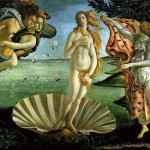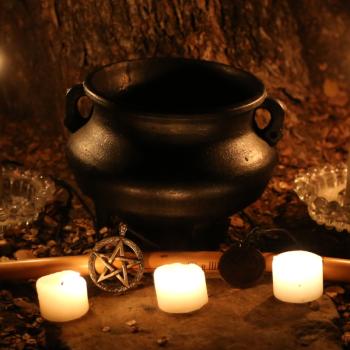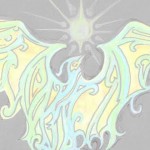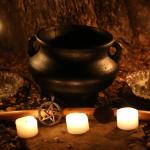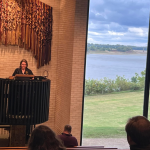I call great Eros, source of sweet delight,
Holy and pure, and lovely to the sight;
Darting, and wing’d, impetuous fierce desire,
With Gods and mortals playing, wand’ring fire…–Thomas Taylor, trans. (1792) The Hymns of Orpheus, p.189.
As we enter the last part of May, we move into the astrological sign of Gemini, the Twins. Gemini is associated in the Western mystery tradition with the tarot card of The Lovers. The traditional images of the card show a couple standing beneath either an angel or the Greek God Eros, or Cupid in his Roman form, in a ceremony of marriage or betrothal.
As the sun enters Gemini, we are poised between Beltane and Midsummer, which represent two different kinds of marriage. Beltane is the season of the marriage of the Spring Goddess and God. It is a time when self reaches out to another to create a partnership of two equals. Midsummer is a celebration of the marriage of the Solar King to the land, in preparation for the sacrifice of Lammas. ‘Kingship’ in a spiritual sense is not confined to one gender or another; and it is not about power or ‘power-over’. It represents a willingness to accept responsibility for the greater whole and to serve it. It is a reaching out of the smaller self to the wider world and a willingness to engage, to create a union with a greater whole – family, land, planet, people.
Keep pure your highest ideal: strive ever towards it
The Lovers represents a basic human desire for uniting with that which is not the self; but to do so well we need to unite the disparate parts of ourselves. As well as an outer union, The Lovers can represent an inner union between the ego, that part of us that we think of as ‘me’, and the deeper self that encompasses all that we are, both good and bad.
One goal of the spiritual quest is to find ourselves and who and what we truly are, to befriend ourselves, and to seek to evolve that self towards that which we hold most dear – our highest ideal. The Lovers can represent self-acceptance – of our strengths and weaknesses, our potential and limitations, our impulses to altruistic and loving behavior, and our impulses to selfishness and destruction. Self-acceptance does not mean that we do not want to change and grow. We can accept what we are, while seeking to evolve and to grow into harmony with the Divine within us.
Scylla and Charybdis
To create the inner marriage, we must navigate the tricky passage between what psychologist Carl Jung called the Scylla and Charybdis of ego inflation – thinking we are more important and special than we are, and ego deflation – believing that we are damaged and inferior to others. Scylla and Charybdis appear in the songs of the ancient Pagan Greek poet Homer and were a rock shoal and a whirlpool on opposite sides of the Strait of Messina between Sicily and mainland Italy. It took courage and skill to navigate between them without being smashed on the rocks of Scylla or sucked down into the watery depths of Charybdis. On our spiritual journey, we too must navigate this tricky passage; a middle way, between accepting ourselves as we are, without needing to be drawn into thinking of ourselves as better or worse than others. We must ‘marry’ these two aspects of ourselves – inferiority and superiority – until at last we see ourselves as we really are.
Individuation and the alchemical marriage
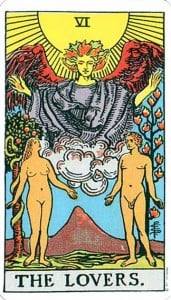
The inner marriage is an alchemical transformation of the base matter of the personality into spiritual gold. It is a process that Carl Jung called ‘individuation’. We let go of false images of ourselves created by our environment and by the projected visions of parents, teachers, friends and lovers. We let go of the Persona, the protective mask we put on to face the world. We face the Shadow, our own inner negativity. We accept our contra-sexual sides, Anima and Animus. We own as ours those aspects of ourselves that we have projected onto other people. This can disrupt our relationships. We may find that others are not the people we thought we were. Sometimes we find that the relationships and activities that satisfied us in the past are no longer appropriate on the next stage of our journey. We have to go back and start again.
This process can be painful and we must acknowledge the ambiguity of the card of The Lovers. The presiding deity, Eros or Cupid, holds in his hands a bow and sharp pointed arrow. Love is inevitably painful and brings with it fear of losing what we have. It is a natural human tendency to seek refuge in the security of the known. We fear the unknown and change. But if we trust to the process of inner change, if we go through and beyond it, we find that we are much greater and richer beings than we thought.
The Lovers can symbolize union between the self and another human being, between the self and humankind as a whole, between the self and the biosphere of which we are part, or between the self and the Divine. All these types of ‘marriage’ or union are important within Paganism. It is our love for something wider and deeper that takes us beyond our own desires and personal interests: lead becomes gold.
In this way there arises a consciousness which is no longer imprisoned in the petty, over sensitive, personal world of the ego, but participates freely in the wider world of objective interests. The widened consciousness is no longer that touchy, egotistical bundle of personal wishes, fears, hopes, and ambitions which always has to be compensated or corrected by unconscious counter-tendencies; instead it is a function of relationship to the world of objects bringing the individual into absolute, binding, and indissoluble communion with the world at large.
–Carl G. Jung (1916/1928/1935). The relations between the ego and the unconscious.
In C. G. Jung (1966 ed.), The collected works of C. G. Jung, vol. 7. London: Routledge & Kegan Paul. p. 178; para. 275.
In preparation for Midsummer, we can ask ourselves, ‘How can I marry the disparate parts of myself to become what I truly am? How can I let go of fear and embrace change?’ Gemini is an astrological sign that loves and embraces change; so let us be change makers – changing ourselves and changing how we interact with the world, so that we may engage with the world around us and serve it.

